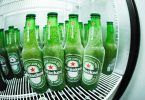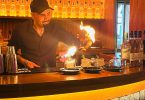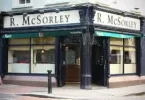Pub trade volumes up in 2017
Despite Dublin vintners enjoying another increase in turnover last year – above those achieved prior to 2007 in some cases – Morrissey’s Review 2017/Outlook 2018 also warns that these increased trade volumes have not been reflected in a like-for-like rise in profits due to increasing operational overheads such as Special Exemption Orders.
“When fees are accounted for, an operator can be met with costs in excess of €700 per Exemption per night,” points out the licensed trade consultant’s report.
Increased Operational Costs
To this, an operator must also factor in other overheads such as staff, electricity and sundries.
“Understandably, many operators have therefore made the conscious decision to either reduce the number of nights they nominate to trade late, or to revert to regular hours of trade altogether.
“Most operators to have taken this step will confirm that the income generated in the hours post 12:30am Fridays & Saturdays will not necessarily cover the cost of the Exemption.”
Rising insurance costs too continued to be of concern to the trade as the majority of operators witnessed another increase in premia in 2018. Independent research conducted through the Licensed Vintners Association on Dublin licensed premises confirmed an average increase in insurance premia of 47% between 2015 & 2016.
Activity
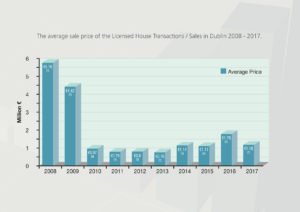
Over nine in 10 Dublin pubs sold last year went for sums under €2 million with the remainder going for between €2 million and €4 million.
However overall activity was down again for the third consecutive year with just 31 transactions recorded compared to 35 in 2016 and 39 in 2015.
Around 65% of Dublin licensed premises sales completed within the past five years have been insolvency-related cases.
But the good news is that while ‘distressed’ transactions remained a driver throughout the 2017 market, they numbered fewer in the 2017 sales figures than in previous years.
“64.3% of sales completed in 2015 were insolvency-related,” states Morrissey’s, “This figure reduced to 53.7% in 2016 and again to 42% in 2017 highlighting the start of a return to a more normal functioning market.”
Morrissey’s points out that 2017 demand increased substantially for the second year running as an increasing number of purchasers gained access to finance through pillar banks and private equity.
The capital value of sales in the Dublin pub market fell 42% from €62.2 million to €36.6 million over the year with the average sale price achieved reducing by a third from €1.78m in 2016 to €1.18m in 2017, more in-line with that of the 2015 market where the average sale price achieved was €1.1m with a total market capital value of €43.33.
The reason for the fall in capital value was due to two factors, Morrissey’s Rory Browne told Drinks Industry Ireland.
“One is the reduction in the total number of sales from 35 in 2016 to 31 in 2017.
“Also, the reduction in the total number of sales in the €2 million to €4 million bracket with no sales completed in excess of €4 million. 2016 had sales recorded in categories €4m-€6m, €8m-€10m and €10m-€12m where 2017 did not.”
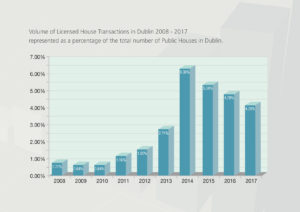
Sales type
Most of last year’s pub sales took place by private treaty at 87.1%, states the auctioneer. Auctions accounted for 9.7% with just 3.2% going post-auction. No pubs were sold by tender.
Increasing demand meeting the lack of supply has led to a growth in the number of off-market approaches as prospective purchasers approach publicans directly; however very few of these sales have concluded, reports the auctioneer.
“There appears to be a gap between what purchasers are prepared to pay and importantly what banks are prepared fund when compared to vendors’ expectations on value.”
Only 4.5% of Dublin licensed premises sold last year were sold for ‘redevelopment’.
Operators believe market appreciating
The report points out that the current vacuum of well-located viable licensed premises that already enjoy, or are capable of enjoying a high volume of trade, remains a cause of frustration amongst purchasers with demand remaining primarily focused on the upper tier of the market.
Quality traditional-style licensed premises located within well-populated districts continue to enjoy consumer support with volumes of business enjoyed on the increase throughout the past 36 months, reports Morrissey’s.
But many licensees who’d been considering selling up have decided instead to continue running the operation in the short term.
“This improvement in trading health feeds directly into operators’ beliefs that they will secure a stronger return when they do step into the marketplace. This is, of course, on the assumption that there are no negative economic influences experienced and demand continues to outstrip supply in the short term.”
Provincial market
In contrast to the Dublin market the provincial rural market continues to struggle with continued closures of licensed premises “… the bulk of which were located in sparsely-populated districts with an oversupply of competing licensed premises”.
Staffing issues
The increasing interaction between staff and consumers has resulted in staff becoming key to the overall success of the product, says the report, with many publicans reporting difficulty in attracting and retaining suitable staff that can adequately carry out the expanded role.
In addition to minimum wage, staff salaries are rising as publicans recognise the importance of hiring and retaining the right staff to ensure the success of their product.
“Changing consumer expectations has meant knowledgeable, well-trained staff are required for successful delivery of a quality product and operators have therefore gained exposure to an increase in wage costs to ensure the hiring and retention of the right staff.”
Restaurant demand for liquor licences
Morrissey’s has in recent months noted an increasing appetite and demand from restaurant operators seeking to licence their existing restaurant operations. This would indicate that restaurateurs are responding to a loss of business by taking on the licensed trade and playing them at their own game just as licensed premises have begun to provide a quality food offering in addition to their drinks menu.
The addition of a publicans licence enables restaurants to include a dedicated public bar within their unit and compete directly with publicans for beverage-only occasions together with the pre-/post-dinner beverage trade, states the report, adding, “Comments from clients represented by our company confirm that this move from the restaurant trade is in response to loss of custom to the on-trade through continued development of quality food offerings and Gastro Pub environments.”
Licence values
The capital value of licences began to increase modestly in 2015 for the first time since 2012, reports Morrissey’s, with licence values being achieved in the order of €50,000.
2017 values achieved remained relatively constant with the vast majority of transactions being completed in the order of €55,000.
Outlook
Morrissey’s expects the improved market sentiment and intensification of funded purchasers experienced in 2017 to continue throughout 2018.





